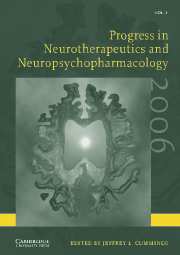Book contents
- Frontmatter
- Contents
- Preface
- Contributors
- Introduction to neurotherapeutics and neuropsychopharmacology
- Rivastigmine in the treatment of dementia associated with Parkinson's disease: a randomized, double-blind, placebo-controlled study
- Modafinil for the treatment of fatigue in multiple sclerosis
- Radiotherapy with concurrent and adjuvant temozolomide: a new standard of care for glioblastoma multiforme
- Treating migraine attacks ASAP: concept and methodological issues
- Early phase trials of minocycline in amyotrophic lateral sclerosis
- Creatine as a potential treatment for amyotrophic lateral sclerosis
- AVP-923 as a novel treatment for pseudobulbar affect in ALS
- Liquid fluoxetine versus placebo for repetitive behaviors in childhood autism
- Testing multiple novel mechanisms for treating schizophrenia in a single trial
- Selegiline in the treatment of negative symptoms of schizophrenia
- Analysis of the cognitive enhancing effects of modafinil in schizophrenia
- Efficacy and tolerability of ziprasidone and olanzapine in acutely ill inpatients with schizophrenia or schizoaffective disorder: results of a double-blind, six-week study, with a six-month, double-blind, continuation phase
- Subject index
- Author index
Modafinil for the treatment of fatigue in multiple sclerosis
Published online by Cambridge University Press: 22 March 2010
- Frontmatter
- Contents
- Preface
- Contributors
- Introduction to neurotherapeutics and neuropsychopharmacology
- Rivastigmine in the treatment of dementia associated with Parkinson's disease: a randomized, double-blind, placebo-controlled study
- Modafinil for the treatment of fatigue in multiple sclerosis
- Radiotherapy with concurrent and adjuvant temozolomide: a new standard of care for glioblastoma multiforme
- Treating migraine attacks ASAP: concept and methodological issues
- Early phase trials of minocycline in amyotrophic lateral sclerosis
- Creatine as a potential treatment for amyotrophic lateral sclerosis
- AVP-923 as a novel treatment for pseudobulbar affect in ALS
- Liquid fluoxetine versus placebo for repetitive behaviors in childhood autism
- Testing multiple novel mechanisms for treating schizophrenia in a single trial
- Selegiline in the treatment of negative symptoms of schizophrenia
- Analysis of the cognitive enhancing effects of modafinil in schizophrenia
- Efficacy and tolerability of ziprasidone and olanzapine in acutely ill inpatients with schizophrenia or schizoaffective disorder: results of a double-blind, six-week study, with a six-month, double-blind, continuation phase
- Subject index
- Author index
Summary
Key words: Multiple sclerosis; modafinil; fatigue; neurotherapeutics; clinical trial.
Introduction and Overview
Fatigue is a disabling symptom in multiple sclerosis (MS), affecting more than 50% of patients with the diagnostic of clinically definite MS. Among patients with fatigue, a high proportion indicates that it represents the most troublesome symptom of the disease (Fisk et al., 1994). As fatigue is a subjective feeling, it usually receives little attention from physicians, patients' family and employers, whereas it has a tremendous impact on the activities of daily life, interfering with work, family life and social activities.
The diagnosis and management of fatigue in MS are complicated by number of issues, including the many forms that the symptom can take. In some cases fatigue may be related to depression, cognitive dysfunction, poor sleeping or motor impairment, defining secondary fatigue. Nevertheless, for many patients, fatigue exists independently of both motor weakness, cognitive or mood disorders: this primary fatigue is felt as an overwhelming sense of tiredness, a lack of energy or a feeling of exhaustion; patients also have the feeling that the effort required to perform action is disproportionately high, and, as a consequence, tend to reduce their physical activity (Comi et al., 2001). This fatigue affects mood and the ability to cope with the disease (Ritvo et al., 1996), and decreases the quality of life (Schwartz et al., 1996).
- Type
- Chapter
- Information
- Publisher: Cambridge University PressPrint publication year: 2006

